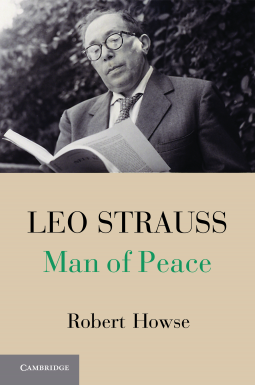
Leo Strauss
Man of Peace
by Robert Howse
This title was previously available on NetGalley and is now archived.
Send NetGalley books directly to your Kindle or Kindle app
1
To read on a Kindle or Kindle app, please add kindle@netgalley.com as an approved email address to receive files in your Amazon account. Click here for step-by-step instructions.
2
Also find your Kindle email address within your Amazon account, and enter it here.
Pub Date 15 Sep 2014 | Archive Date 1 Oct 2014
Description
A groundbreaking new view on the neoconservative icon
Leo Strauss is known to many people as a thinker of the right, who inspired hawkish views on national security and perhaps even advocated war without limits. Moving beyond gossip and innuendo about Strauss's followers and the Bush administration, this book provides the first comprehensive analysis of his writings on political violence, considering also what he taught in the classroom on this subject. In stark contrast to popular perception, Strauss emerges as a man of peace, favorably disposed to international law and skeptical of imperialism, and a critic of radical ideologies (right and left) who warns of the dangers to free thought and civil society when philosophers and intellectuals ally themselves with movements that advocate violence.
Robert Howse provides new readings of Strauss's confrontation with fascist/Nazi jurist Carl Schmitt, his debate with Alexandre Kojève about philosophy and tyranny, and his works on Machiavelli and Thucydides, and examines Strauss's lectures on Kant's Perpetual Peace and Grotius's Rights of War and Peace.
Advance Praise
No Advance Praise Available
No Advance Praise Available
Marketing Plan
Advance reading copies available
National print, broadcast, digital media campaign
Social media promotion on Facebook and Twitter
Advance reading copies available
National print, broadcast, digital media campaign
Social media promotion on Facebook and Twitter
Available Editions
| EDITION | Paperback |
| ISBN | 9781107427679 |
| PRICE | US$29.99 (USD) |
Average rating from 1 member
Featured Reviews
 Educator 198608
Educator 198608
Because this is not my field of expertise, I will not be publishing my review, but I will leave the following on Goodreads and Amazon:
--
The legacy of the political philosopher Leo Strauss has taken a rather unfortunate turn in the 21st century. After 9/11, neoconservatives claimed to see in Strauss a justification for benevolent imperialism in the name of ensuring worldwide liberty. American progressives, in response, claimed to have unveiled Strauss as a secret fascist, by employing a cynical reading of Strauss’ own theory of secret meanings.
In this book, not a biography so much as a critical analysis, Howse strips away the layers of ideology in order to restore Strauss to the ranks of the 20th century’s greatest thinkers. He shows that Strauss’ real project was not to turn free nations into fascist ones, but to show how tradition could continue to live in the civilized world without being threatened by the destructive power of modernity. Strauss proposes that civil discourse with outsiders is not harmful to culture, as fascists of all ages have claimed, but in fact can help make a culture better. In effect Strauss offers an antidote to Nietzsche’s powerful narrative of God being murdered by the intrusion of outside chaos.
Howse not only gives us a sympathetic reading of Strauss but helps us understand why it is important to read Strauss. The author eloquently summarizes Strauss’s sympathetic reading of Carl Schmitt, Machiavelli, and Nietzsche, and proves quite convincingly that the point of his sympathy is not to endorse these more dangerous thinkers, but to definitively demonstrate the fundamental flaw that underlies each of their world-systems, for example, Schmitt's failure to explain what kind of authority should be adhered to in his classic state of emergency, or "Machiavelli's failure to give clear outlines of the kind of ideal regime implied by his political teaching." Howse’s writing is admirably easy to read, making Strauss accessible to his critics who were apparently unable to grasp his more fundamental points.
Obviously, this book should be recommended to people who are convinced Strauss is a neoconservative or fascist, but it deserves a broader audience as well. It will make a useful reference for anyone with an interest in political philosophy, especially if they are not totally fluent in Strauss. It is to be noted that it is not a comprehensive introduction to his style of thought, but this was not the author's intent.



